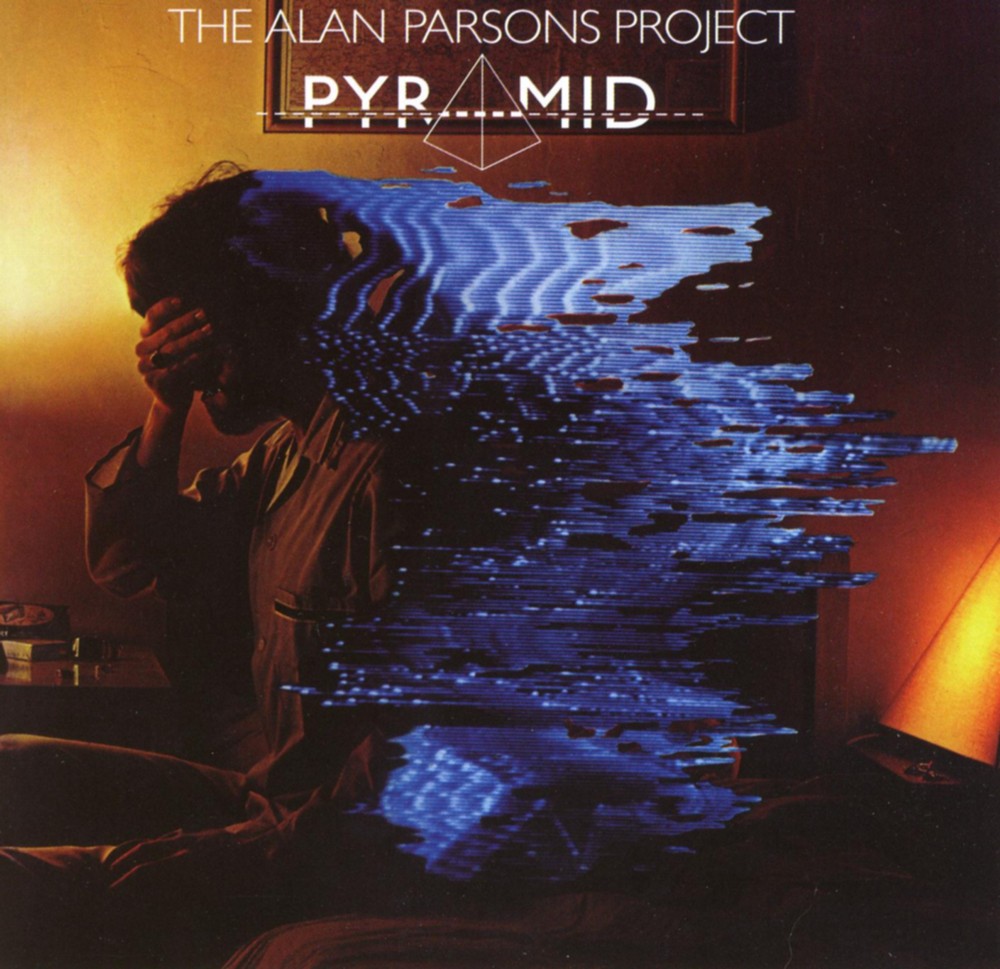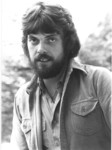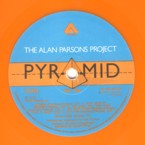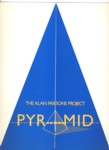
|
The Alan Parsons Project |
Pyramid |

|
The Alan Parsons Project |
Pyramid |
This album was originally released by Arista Records in 1978, at the height of Pyra-mania. This album was called "a look at yesterday through the eyes of today" in an Arista press kit.
From the album notes:
Pyramid
From the rise and fall of an ancient dynasty, to the quest for a key to unlock the secrets of the universe, this album seeks to amplify the haunting echoes of the past and explore the unsolved mysteries of the present. Pyramid... the last remaining wonder of the ancient world.
March 10, 2008 saw the release of a remastered version of this album, complete with bonus tracks and improved packaging.
| Concept: |
| AP: "The history and mystique of the pyramids, and the cult followings that have continued to abound. Many people believe that their existence goes beyond being just slabs of stone in Egypt, put there as a tomb for the pharaohs." |
| Voyager | instrumental | (2:14) |
| What Goes Up... | vocal: David Paton | (3:40) |
| The Eagle Will Rise Again | vocal: Colin Blunstone | (4:22) |
| One More River | vocal: Lenny Zakatek | (4:16) |
| Can't Take It With You | vocal: Dean Ford (backing vocal: Eric Woolfson, David Paton, Stuart Tosh) | (5:06) |
| In The Lap of Gods | instrumental | (5:30) |
| Pyramania | vocal: Jack Harris | (2:42) |
| Hyper-Gamma Spaces | instrumental | (4:20) |
| Shadow of a Lonely Man | vocal: John Miles | (5:44) |
| BONUS TRACKS | ||
| Voyager/ What Goes Up/The Eagle Will Rise Again (Instrumental Version) | instrumental | (8:55) |
| What Goes Up/ Little Voice (Early Version Demo) | vocal: Eric Woolfson | (4:07) |
| Can't Take It With You – Early Version Demo | instrumental | (1:45) |
| Hyper-Gamma-Spaces (Demo) | instrumental | (2:21) |
| The Eagle Will Rise Again (Alternative Version Backing Track) | instrumental | (3:20) |
| In The Lap Of The Gods Part I (Demo) | instrumental | (3:14) |
| In The Lap Of The Gods Part II (Backing Track Rough Mix) | instrumental | (1:56) |
Voyager
Kantele John Leach Rhodes Alan Parsons Synths Duncan Mackay Projectron Eric Woolfson Guitars Ian Bairnson Bass David Paton Drums Stuart Elliott
What Goes Up
Vocal David Paton Rhodes Eric Woolfson Guitars Ian Bairnson Acoustic Guitars Ian Bairnson, David Paton Bass David Paton Drums and Percussion Stuart Elliott The English Chorale Choirmaster - Bob Howes Orchestra and choir arranged and conducted by Andrew Powell
The Eagle Will Rise Again
Vocal Colin Blunstone Clavichord and Virginal Eric Woolfson Guitars Ian Bairnson Bass David Paton Drums Stuart Elliott Autoharp Andrew Powell Backing Vocals David Paton, Eric Woolfson, Alan Parsons Orchestra arranged and conducted by Andrew Powell
One More River
Vocal and vocal FX Lenny Zakatek Guitars and backwards wah-wah Ian Bairnson Acoustic Guitars Ian Bairnson, David Paton Bass David Paton Drums and Percussion Stuart Elliott Synths and Hammond Duncan Mackay Sax Phil Kenzie Orchestra arranged and conducted by Andrew Powell
Can't Take It With You
Vocals Dean Ford Guitars Ian Bairnson Acoustic Guitars Ian Bairnson, David Paton, Alan Parsons Bass David Paton Drums and Percussion Stuart Elliott Piano Eric Woolfson Synths Duncan Mackay Backing Vocals Dean Ford, David Paton, Eric Woolfson
In The Lap Of Gods
Middle Eastern Wooden Flute Unidentified member of the London Philharmonia Cimbalom John Leach Piano and Organ Eric Woolfson Acoustic Guitars Ian Bairnson, David Paton Bass David Paton Drums and Percussion Stuart Elliott Backing Vocals Dean Ford, David Paton, Eric Woolfson The English Chorale Choirmaster - Bob Howes Orchestra and Choir arranged and conducted by Andrew Powell
Pyramania
Vocals Jack Harris Jangle Piano Eric Woolfson Synths Duncan Mackay Guitar Ian Bairnson Bass David Paton Drums and Percussion Stuart Elliott Synth Tuba and Honky-tonk solos Duncan Mackay
Hyper-Gamma Spaces
Wurlitzer and Projectron Alan Parsons Synths Duncan Mackay Bass David Paton Drums and Percussion Stuart Elliott
Shadow Of A Lonely Man
Vocal John Miles Additional Vocal Colin Blunstone Piano Eric Woolfson Projectron Alan Parsons Acoustic Guitars Ian Bairnson, David Paton Bass David Paton Drums and Percussion Stuart Elliott Backing Vocals Olive Simpson Orchestra arranged and conducted by Andrew Powell
BONUS MATERIAL NOTES
by Eric Woolfson & Alan Parsons
January 2008
The recording process contains many magical moments on the creative journey. The process is not unlike throwing a lump of clay on a potter's wheel and then shaping and re-shaping the material an infinite number of times until the potter is satisfied. A casual observer might say "but you had the pot within the first minute, why didn't you just leave it at that." The art of the potter is to know just how far to go. The record producer's skill is to know when that point has been reached as far as the recordings are concerned and the writer has to apply a similar process to his compositions. They say a poem is never finished, it is abandoned. The same could certainly be said of music, lyrics or any creative effort. The great advantage of the recording process is that as one keeps rough mixes as a guide, one can delve into stages before the point of abandonment and revisit some of the magic from earlier attempts or stages.
Whenever the core musicians compete a basic backing track, there is a sensation of having reached a plateau and although the eventual production may take the recording in a totally different direction, at that moment something rather special has been created which the music buyer is often unaware of.
Amongst this collection of bonus material, there are several examples of the magical early takes and in this re-mastered version of Pyramid, for those interested in the process, there is a unique opportunity to glimpse behind the curtain of the recording process.
From our personal point of view, it has been a fascinating experience to re-live these early stages, much of which were kept in archives and tape libraries and which might have well been forgotten with the passage of time but for the initiative of Tim Fraser-Harding at SONY BMG. We are also grateful to Haydn Bendall for his untiring patience and skill in assisting us in our trawl through the archives to complete this material.
Voyager/ What Goes Up/The Eagle Will Rise Again (Instrumental Version) This was an early version of Voyager before it became extended into the version that was used on the album. It leads into basic tracks of What Goes Up and The Eagle Will Rise Again with orchestra and guide keyboards to which vocals were later added. In this version, elements of the recording, particularly the orchestra, can be heard clearly which were subsequently (out of necessity) submerged in the mix to support the vocals. The percussive keyboard sound on The Eagle Will Rise was a composite of some unusual traditional plucked keyboard instruments which Eric had collected and when played together, created this distinctive sound. What Goes Up/ Little Voice (Early Version Demo) Often in the studio there was experimentation with songs or sections of songs to see what worked in sequence. In developing ‘What Goes Up’ Eric included another song at one stage entitled ‘Little Voice’ which can be heard in this demo version, though it was subsequently not used. Can't Take It With You Early Version Demo “This is a demo of the track at Abbey Road where (unusually) I was in the studio playing all the instruments. I’m particularly embarrassed about the drumming!” – AP Hyper-Gamma-Spaces (Demo) An early rough demo but it's interesting to note that the basic format didn't change that much. The title ‘Hyper-Gamma-Spaces’ came from Eric’s brother Richard, who is a mathematician and whose Doctoral Thesis carried this title. Eric felt it sounded a little bit Pink Floyd like which appealed to Alan and seemed to match the electronics that Alan had programmed as the basis for the track. The Eagle Will Rise Again (Alternative Version Backing Track) It was Eric’s intention on the Pyramid album to reprise some of the songs and he had anticipated ‘The Eagle Will Rise Again’ being revisited as a rock band version. This recording was a demo attempt, but the whole idea was abandoned as there was more than enough material already on the album. In The Lap Of The Gods Part I (Demo) This is an example of Eric’s guide piano which was subsequently replaced by Andrew Powell’s superb orchestrations, but in this bonus track the basis can clearly be heard. In The Lap Of The Gods Part II (Backing Track Rough Mix) A basic backing track of what later became the final version, it contains some impromptu musical contributions from various studio musicians which were excluded or adapted in the final version.
Original Credits
Produced by Alan Parsons
Executive Producer - Eric Woolfson
Orchestra and Choir arranged and conducted by Andrew Powell
Engineered by Alan Parsons
Assistant Engineers - Pat Stapley, Chris Blair
Mastering by Chris Blair
Orchestral Contractor David Katz
Choirmaster Bob Howes
Bass: David Paton
Drums and Percussion: Stuart Elliott
Electric Guitars: Ian Bairnson
Acoustic Guitars: Ian Bairnson, David Paton, Alan Parsons
Keyboards: Eric Woolfson, Duncan Mackay
Vocals: Colin Blunstone, Dean Ford, David Paton, Lenny Zakatek, Jack Harris, John Miles
Special Thanks to: Phil Kenzie, John Leach, Olive Simpson, The English Chorale, Smokey and Hazel, EMI Technical Engineers, Necam, and all at Abbey Road
Cover Design Hipgnosis, photos Hipgnosis-Brimson
Special thanks to Smokey, Hazel and all at Abbey Road
Originally published in the U.K. by WOOLFSONGS LTD.
All compositions copyright 1978 Woolfsongs Ltd./Careers Music Inc.
Administered by IRVING MUSIC INC. (BMI)
All tracks written by Eric Woolfson/Alan Parsons
Reissue Credits
Recorded at Abbey Road Studios, London between September 1977 and February 1978
Compiled for reissue by Eric Woolfson & Haydn Bendall (for Woolfsongs Ltd.), Tim Fraser-Harding & Jeff Magid (for SONY BMG) and Alan Parsons.
Reissue design by Mainartery Design, London (www.mainartery.co.uk)
Memorablia - with thanks to Steve Martin, Sally Seddon and Mainartery
Special thanks to Tim Fraser-Harding, Haydn Bendall and Sally Seddon
One of the benefits of the Expanded Edition of the classic APP albums is the improved bookelets and extra artwork. Early in the remastering project Tim Fraser-Harding contacted Steve Martin at The Avenue about artwork and rarities.
Many of the images submitted were used within the booklet, but just like "Little Voice", some things got left on the cutting room floor. In spirit of the Extended Editions, here are three of the images that didn't make the cut.
 |
 |
 |
Left: Photo from Arista Press Kit; Middle: limited-edition orange vinyl edition; Right: Press Kit folder (opens from center).
Click on any image to enlarge.
This page, copyright 2009 The Avenue / Avenue Communications.